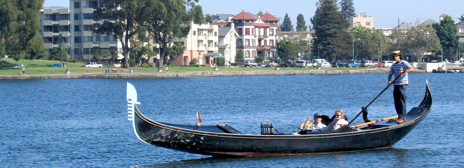Flashlight tour illuminates neighborhood ghost stories
By Bill Picture
Published: October, 2005
By day, the streets of San Francisco’s Chinatown are bustling with meandering groups of map-slinging tourists, and locals on their way from the market clutching pink plastic bags with the ingredients for that night’s dinner. But when the sun disappears behind Twin Peaks and the shops along Grant Avenue close for the evening, locals believe the restless spirits of their ancestors roam Chinatown’s desolate side streets, dark back-alleys and narrow passageways.
While growing up in Chinatown, Empress Yee, founder of San Francisco Chinatown Ghost Tours, heard countless stories about encounters with the supernatural, which she now shares with ghost seekers during her flashlight-lit tours of the neighborhood.
"Whenever the women in the neighborhood would get together for tea, they would trade ghost stories," Yee explains. "My mother ran a temple, and people would come to her and say they had a spirit in their house. So, I heard a lot of the [stories] that I include in the tour from my mother and her friends."
Yee weaves a generous handful of these chilling tales together, with interesting historical tidbits culled from the pages of the day, to offer tour-goers a taste of Chinatown’s colorful past. That past, like so much of San Francisco’s, is dotted with scandalous accounts (at least for the time) of sex, drugs and gambling. Name a vice, any vice, and chances are it was for sale in Chinatown.
For instance, there are two accounts of how Hang-Ah Alley or "Fragrant Alley," one of the stops on the San Francisco Chinatown Ghost Tour, got its unusual name. The official story is that the name was given to the alley (then called "Pagoda Alley") after a perfume manufacturer from Germany set up shop there. But locals say the alley got its name from the fragrant lotus flower perfume worn by the exotic ladies of the evening who entertained gentlemen in the brothels that bordered the alley during the Barbary Coast days.
Of course, the perfume shop and the brothels are long since gone. But people still report catching an unexplained whiff of lotus flower perfume while walking through the alley. In fact, it’s happened twice during Yee’s tour.
"And I hadn’t even told them the story yet," she says. "It was creepy. But we all had a good laugh about it afterward."
At another stop, Yee tells the tragic story of a starlet found dead in her dressing room at the old Chinese opera house on Grant Avenue. Legend has it that, after the actress’s death, audience members reported seeing the young woman’s ghost onstage taking her bows during the final curtain call.
The opera house has since been replaced with a shopping mall. Similarly, many of the centuries-old Chinese traditions brought over by immigrants have, over the years, been traded for American values. But Yee says superstition still runs strong in the Chinese-American community, though it too wanes slightly with each passing generation.
As proof, she points out the Ba Gua mirrors that hang above many of the doorways in Chinatown. The eight-sided mirror is believed to offer protection from negative energy and send less-than-friendly spirits on their way.
And twice each year, locals participate in a ceremony honoring departed spirits. During the ceremony, bowls of rice, chopsticks, tea and paper "spirit money" are brought to the temple and offered to the spirits for them to use in the afterlife.
Yee insists she’s a believer. She too participates in the spirit-appeasing ceremonies each year and swears that she was once paid a visit by a ghost.
"I was in a hotel room and something woke me up in the middle of the night," she says. "It was a strange chill across my face like someone was fanning me. And then I smelled cigar. I asked the people at the front desk the next morning if anything unusual had ever happened in that room. They just looked at me funny, but I knew what I had experienced. It was a spirit."
Chinatown Ghost Tours
Fri. & Sat. 7:30 p.m.
www.sfchinatownghosttours.com


